How To Change Cell Size In Excel Without Affecting Other Cells
Lesson 6: Modifying Columns, Rows, and Cells
/en/excel2016/cell-nuts/content/
Introduction
By default, every row and column of a new workbook is gear up to the same height and width. Excel allows you lot to change column width and row height in dissimilar means, including wrapping text and merging cells.
Optional: Download our do workbook.
Picket the video below to learn more than about modifying columns, rows, and cells.
To modify cavalcade width:
In our example below, column C is besides narrow to display all of the content in these cells. We can make all of this content visible by irresolute the width of cavalcade C.
- Position the mouse over the column line in the column heading so the cursor becomes a double arrow.
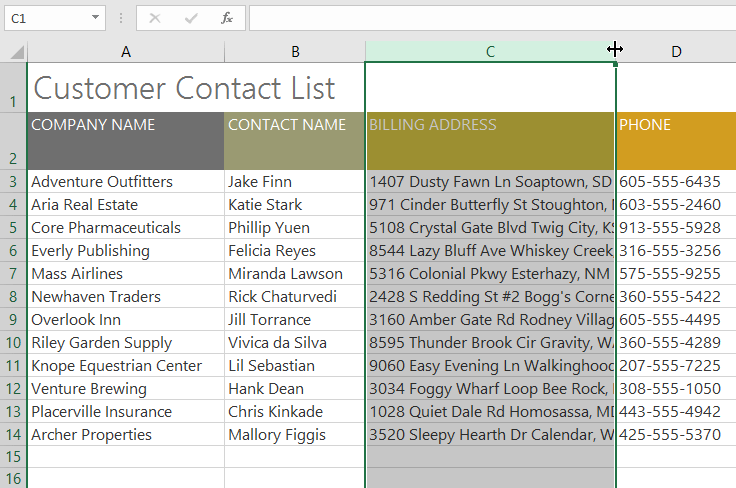
- Click and drag the mouse to increment or subtract the column width.
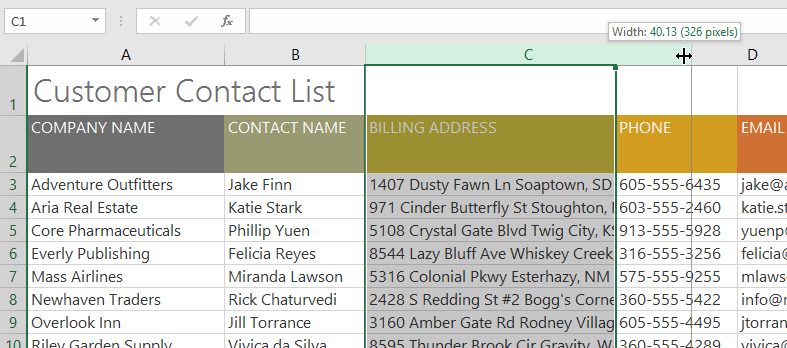
- Release the mouse. The cavalcade width will be inverse.
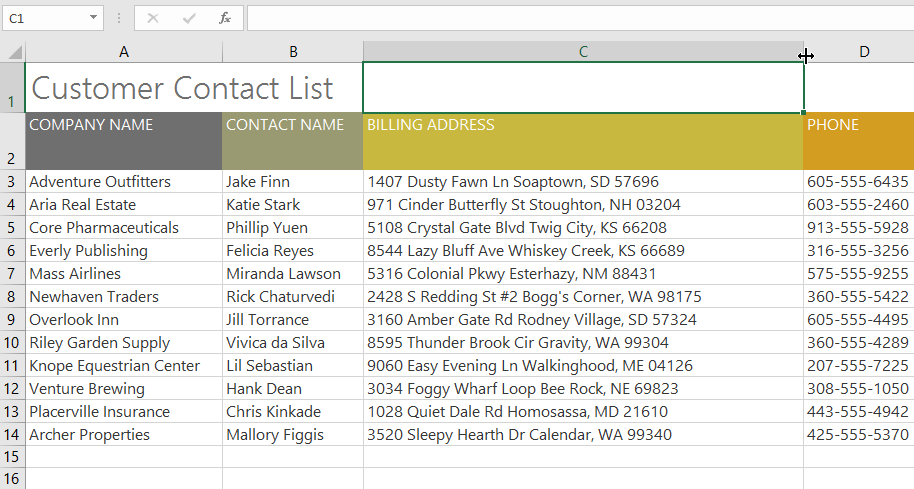
With numerical data, the jail cell will brandish pound signs (#######) if the column is too narrow. Merely increase the column width to brand the data visible.
To AutoFit cavalcade width:
The AutoFit characteristic volition allow you lot to set a column'southward width to fit its content automatically.
- Position the mouse over the cavalcade line in the column heading so the cursor becomes a double arrow.
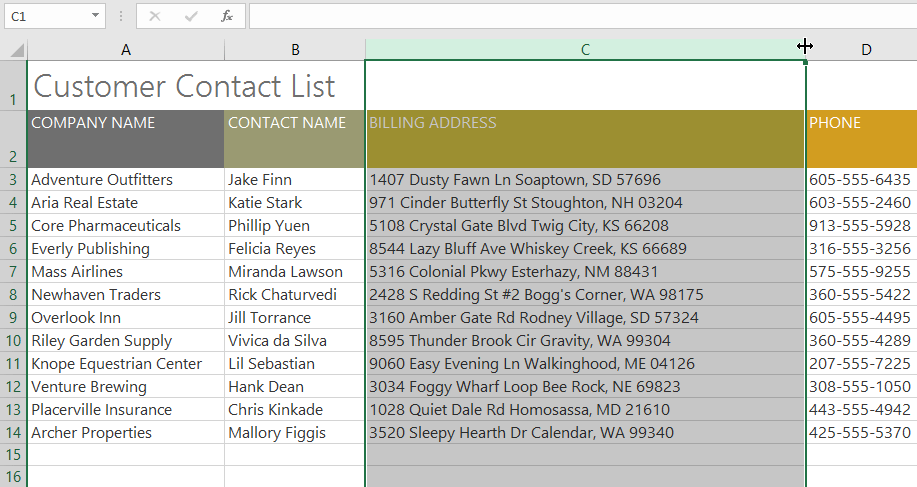
- Double-click the mouse. The cavalcade width will be changed automatically to fit the content.
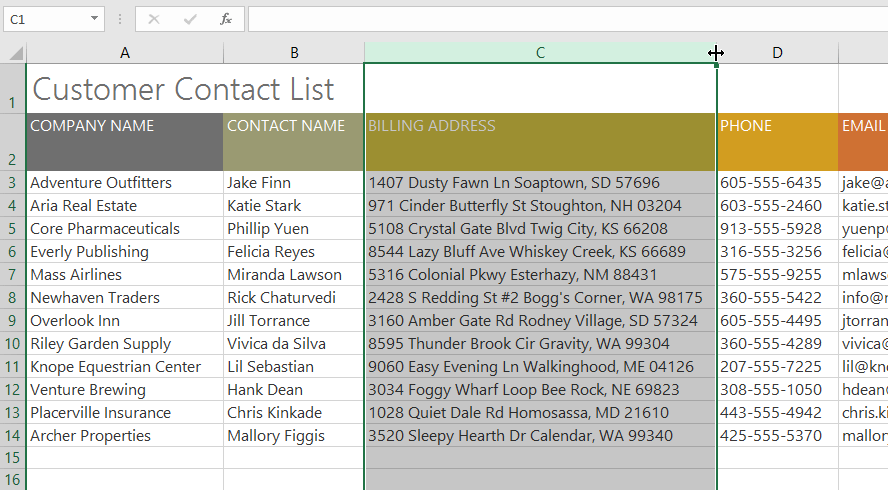
You lot tin also AutoFit the width for several columns at the same time. But select the columns you want to AutoFit, and then select the AutoFit Column Width command from the Format drop-down menu on the Home tab. This method tin too exist used for row height.
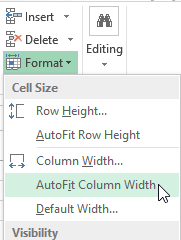
To modify row pinnacle:
- Position the cursor over the row line then the cursor becomes a double arrow.
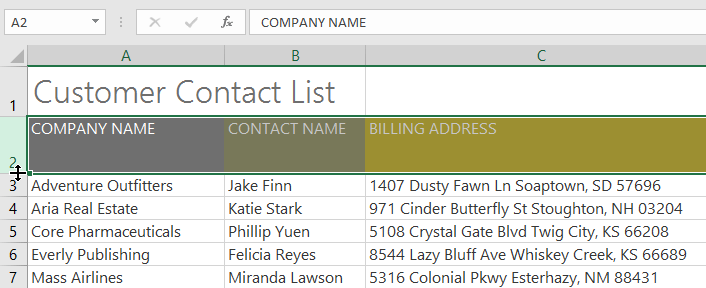
- Click and drag the mouse to increase or subtract the row tiptop.
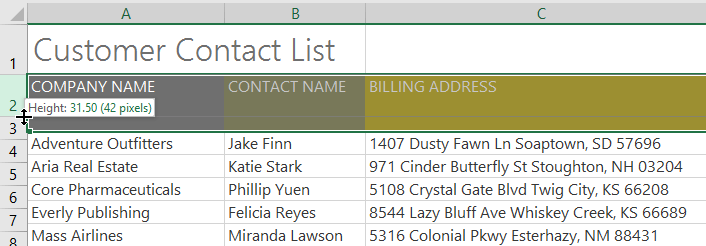
- Release the mouse. The height of the selected row will be changed.
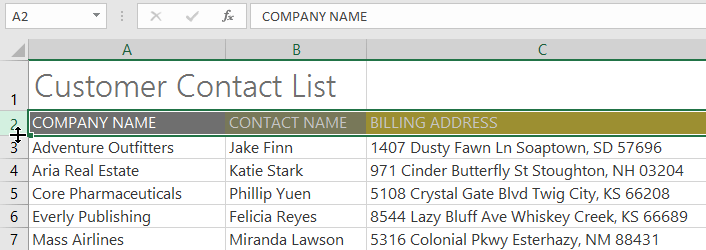
To modify all rows or columns:
Instead of resizing rows and columns individually, you tin modify the height and width of every row and column at the same time. This method allows you to set a uniform size for every row and column in your worksheet. In our example, we volition fix a uniform row height.
- Locate and click the Select All button just below the name box to select every cell in the worksheet.
- Position the mouse over a row line so the cursor becomes a double arrow.
- Click and drag the mouse to increase or decrease the row height, then release the mouse when you are satisfied. The row elevation will exist changed for the unabridged worksheet.
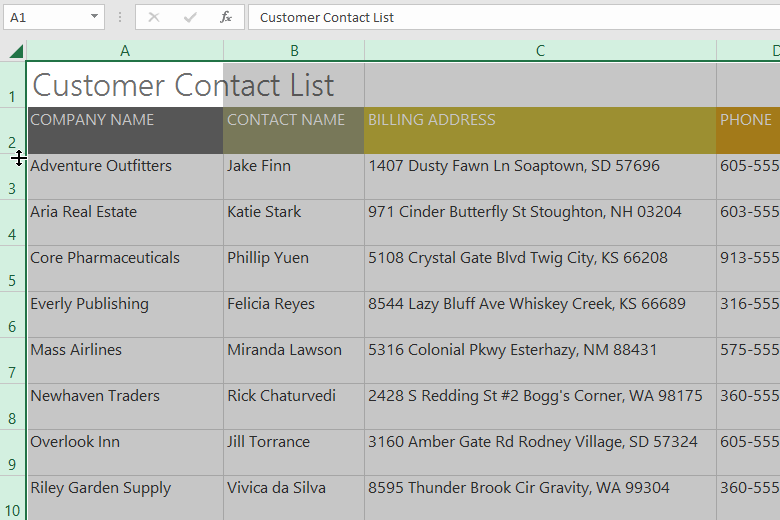
Inserting, deleting, moving, and hiding
Subsequently you've been working with a workbook for a while, you may detect that you want to insert new columns or rows, delete sure rows or columns, movement them to a different location in the worksheet, or even hide them.
To insert rows:
- Select the row heading beneath where you lot want the new row to appear. In this example, we want to insert a row betwixt rows iv and 5, then we'll select row 5.
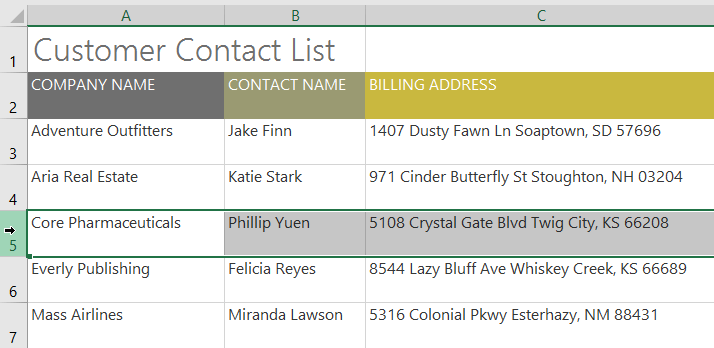
- Click the Insert control on the Home tab.

- The new row will appear higher up the selected row.
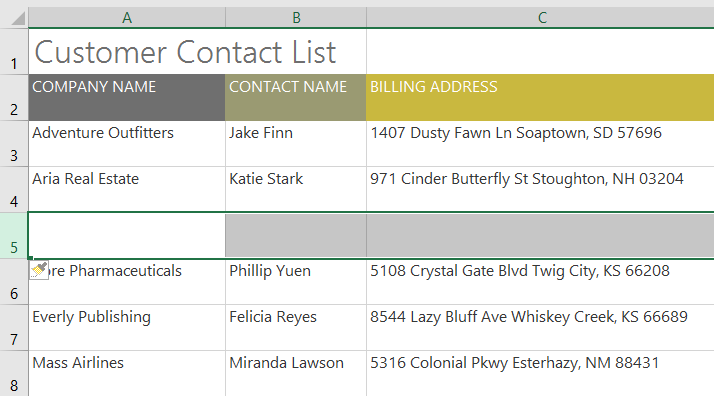
When inserting new rows, columns, or cells, you will see a paintbrush icon next to the inserted cells. This button allows yous to choose how Excel formats these cells. By default, Excel formats inserted rows with the same formatting as the cells in the row above. To access more than options, hover your mouse over the icon, and then click the driblet-down pointer.
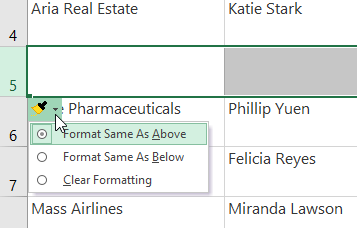
To insert columns:
- Select the cavalcade heading to the right of where you want the new column to appear. For instance, if you lot want to insert a cavalcade betwixt columns D and E, select column East.
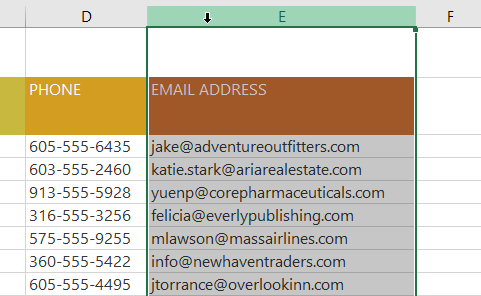
- Click the Insert command on the Home tab.
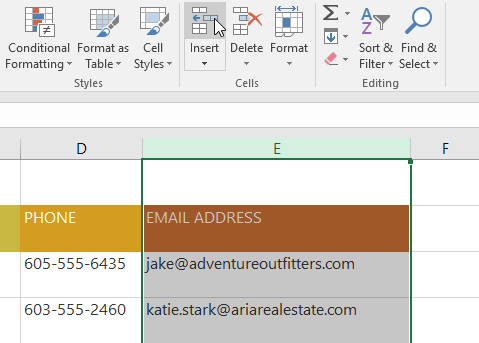
- The new column will appear to the left of the selected column.
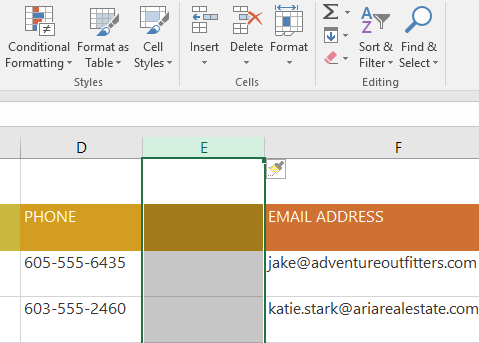
When inserting rows and columns, brand sure you select the entire row or cavalcade by clicking the heading. If you select only a prison cell in the row or column, the Insert command will only insert a new cell.
To delete a row or cavalcade:
It's easy to delete a row or column that you no longer need. In our example we'll delete a row, but you tin delete a column the same way.
- Select the row you want to delete. In our example, we'll select row 9.
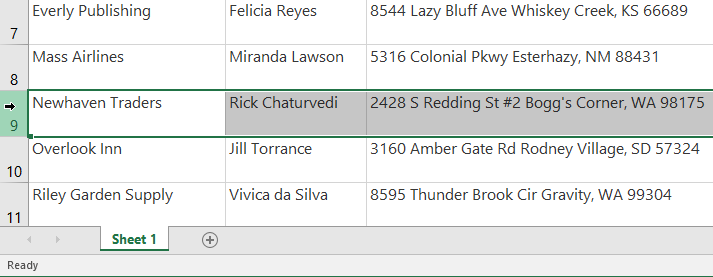
- Click the Delete command on the Domicile tab.

- The selected row volition be deleted, and those effectually information technology will shift. In our example, row 10 has moved upwards, so it'due south now row ix.
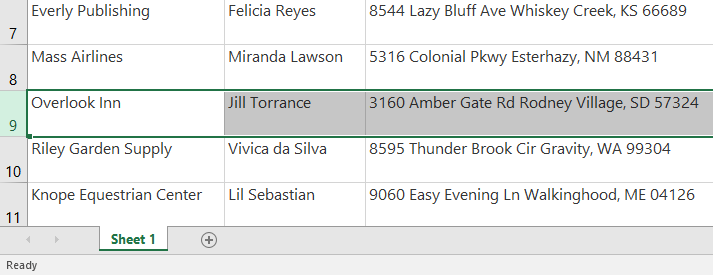
Information technology's important to empathise the difference between deleting a row or column and only clearing its contents. If you want to remove the content from a row or column without causing others to shift, right-click a heading, so select Articulate Contents from the drop-downward menu.
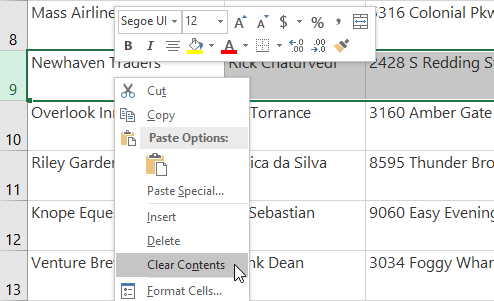
To movement a row or column:
Sometimes you may want to movement a column or row to rearrange the content of your worksheet. In our example we'll motion a column, but you can movement a row in the aforementioned way.
- Select the desired column heading for the column you want to motility.
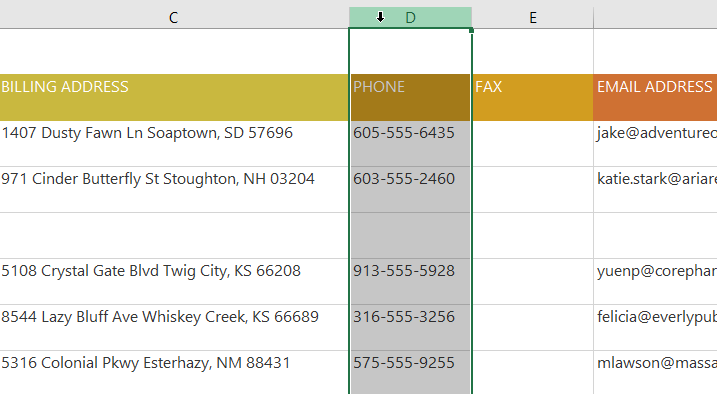
- Click the Cutting control on the Home tab, or press Ctrl+Ten on your keyboard.
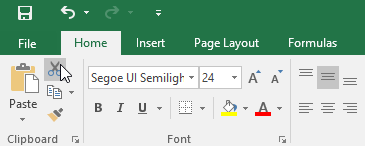
- Select the cavalcade heading to the right of where you want to move the cavalcade. For instance, if yous want to move a column between columns E and F, select column F.
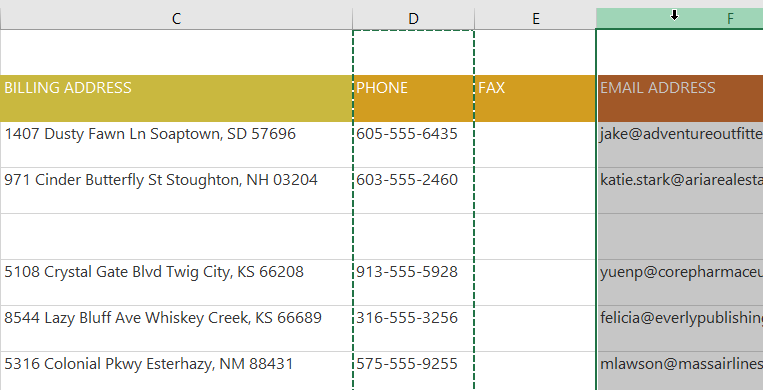
- Click the Insert command on the Habitation tab, then select Insert Cut Cells from the drop-down bill of fare.
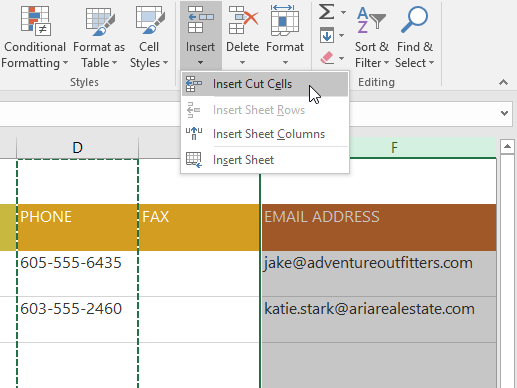
- The column will be moved to the selected location, and the columns around it volition shift.
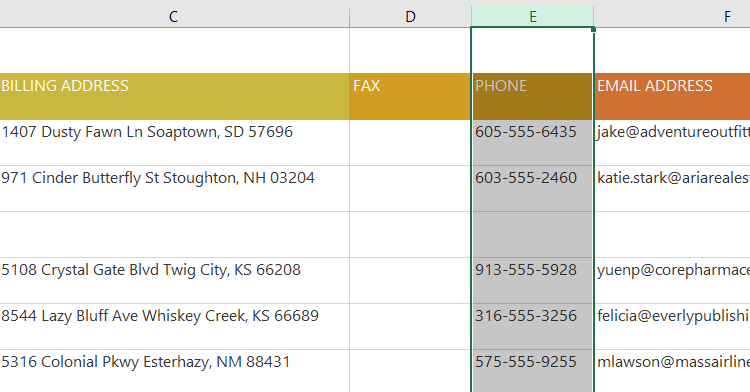
You can likewise access the Cut and Insert commands by right-clicking the mouse and selecting the desired commands from the drop-downwards menu.
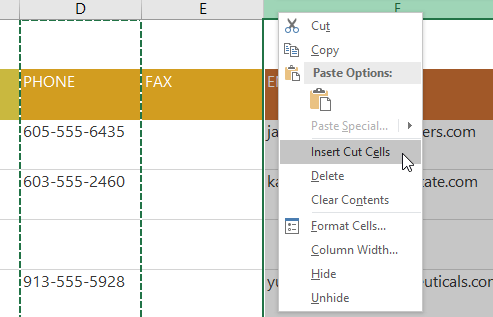
To hide and unhide a row or column:
At times, you may want to compare certain rows or columns without irresolute the arrangement of your worksheet. To practice this, Excel allows you lot to hide rows and columns every bit needed. In our example we'll hide a few columns, but you can hide rows in the same fashion.
- Select the columns you want to hide, right-click the mouse, then select Hide from the formatting menu. In our instance, we'll hide columns C, D, and E.
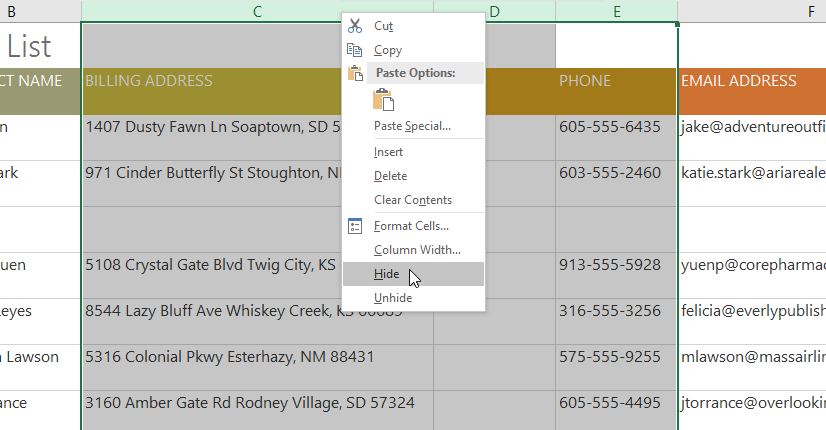
- The columns volition exist hidden. The light-green cavalcade line indicates the location of the hidden columns.
- To unhide the columns, select the columns on both sides of the subconscious columns. In our instance, we'll select columns B and F. Then correct-click the mouse and select Unhide from the formatting card.
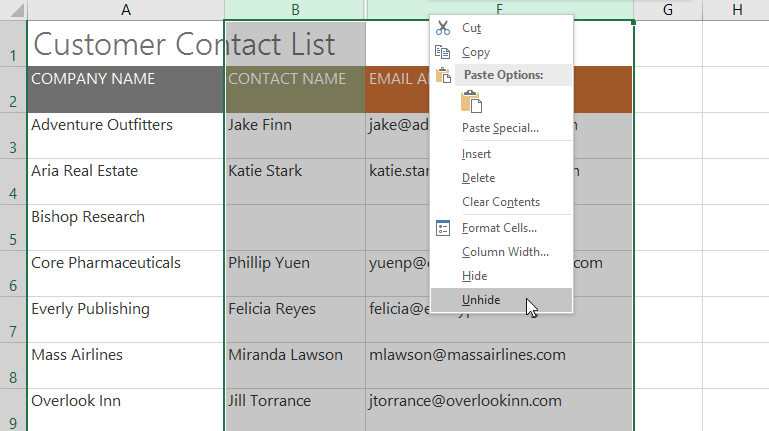
- The hidden columns volition reappear.
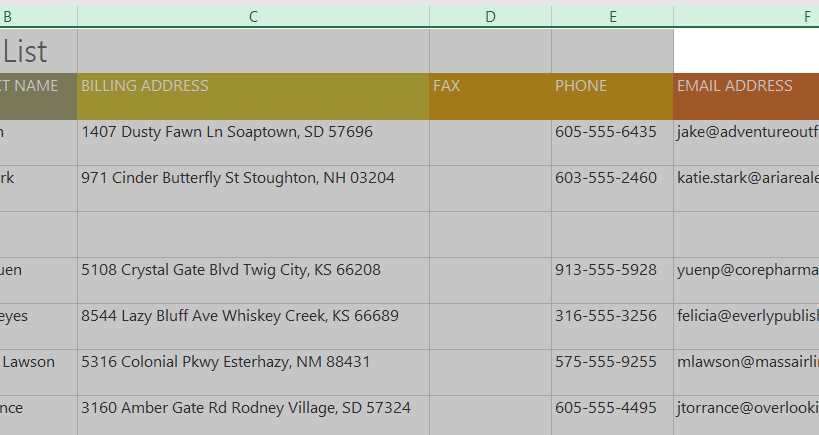
Wrapping text and merging cells
Whenever you have too much jail cell content to be displayed in a unmarried cell, you may make up one's mind to wrap the text or merge the cell rather than resize a column. Wrapping the text volition automatically modify a cell'southward row tiptop, assuasive cell contents to be displayed on multiple lines. Merging allows you to combine a cell with adjacent empty cells to create one big jail cell.
To wrap text in cells:
- Select the cells yous desire to wrap. In this example, nosotros'll select the cells in column C.
- Click the Wrap Text command on the Home tab.
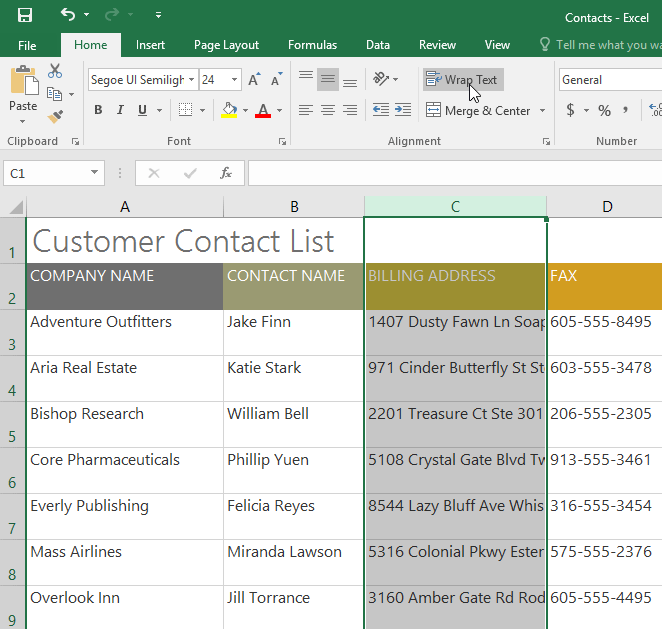
- The text in the selected cells will be wrapped.
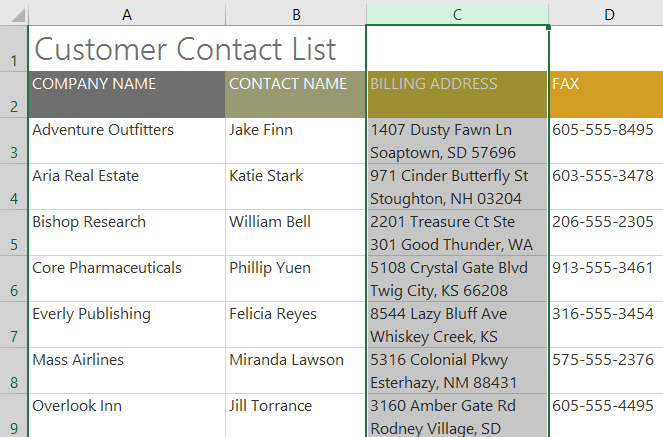
Click the Wrap Text command once more to unwrap the text.
To merge cells using the Merge & Center control:
- Select the cell range you want to merge. In our example, we'll select A1:F1.
- Click the Merge & Center command on the Home tab. In our example, we'll select the cell range A1:F1.
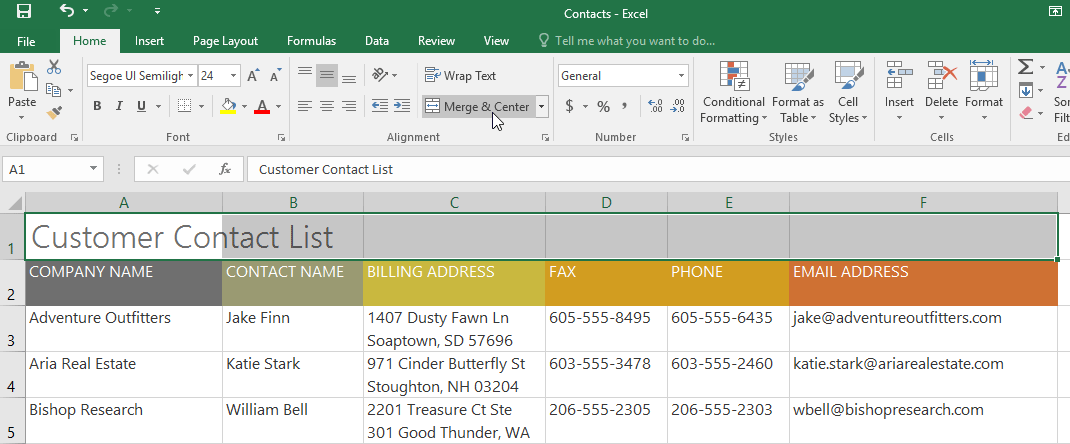
- The selected cells will be merged, and the text will be centered.

To access more merge options:
If y'all click the drop-down arrow next to the Merge & Center control on the Domicile tab, the Merge drop-down carte volition appear.
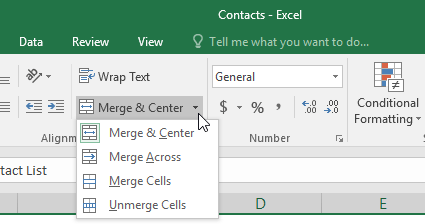
From here, you tin choose to:
- Merge & Centre: merges the selected cells into one cell and centers the text
- Merge Across: merges the selected cells into larger cells while keeping each row separate
- Merge Cells: merges the selected cells into ane cell just does not center the text
- Unmerge Cells: unmerges selected cells
You lot'll desire to be careful when using this feature. If you merge multiple cells that all contain data, Excel will proceed only the contents of the upper-left cell and discard everything else.
To eye across selection:
Merging can be useful for organizing your information, but information technology tin can also create problems subsequently. For example, it tin exist difficult to move, copy, and paste content from merged cells. A expert culling to merging is Eye Beyond Selection , which creates a similar effect without really combining cells.
Watch the video below to learn why you should use Center Across Option instead of merging cells.
- Select the desired cell range. In our example, we'll select A1:F1. Note: If you already merged these cells, y'all should unmerge them before continuing to step 2.
- Click the small arrow in the lower-right corner of the Alignment group on the Home tab.
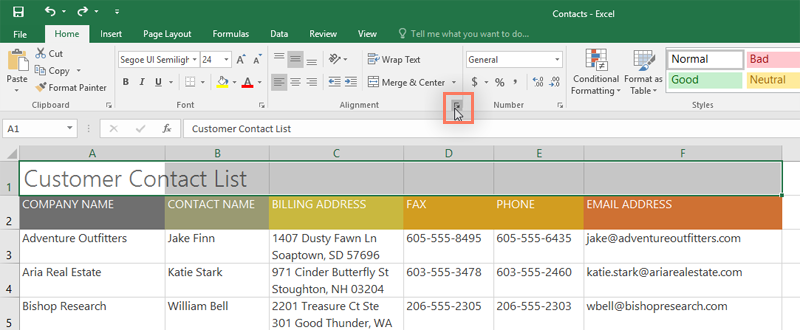
- A dialog box will appear. Locate and select the Horizontal drop-down card, select Center Across Option, then click OK.
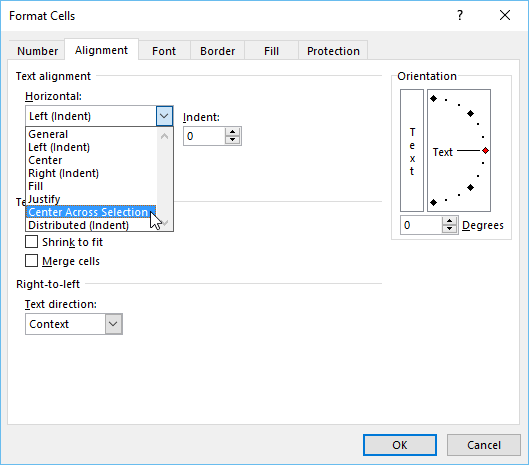
- The content will exist centered beyond the selected cell range. Equally you can see, this creates the aforementioned visual result as merging and centering, but information technology preserves each cell within A1:F1.

Challenge!
- Open our do workbook.
- Autofit Column Width for the entire workbook.
- Modify the row top for rows 3 to 14 to 22.five (30 pixels).
- Delete row 10.
- Insert a column to the left of column C. Type SECONDARY CONTACT in jail cell C2.
- Make sure cell C2 is nevertheless selected and choose Wrap Text.
- Merge and Center cells A1:F1.
- Hide the Billing Address and Phone columns.
- When you're finished, your workbook should look something like this:

/en/excel2016/formatting-cells/content/
How To Change Cell Size In Excel Without Affecting Other Cells,
Source: https://edu.gcfglobal.org/en/excel2016/modifying-columns-rows-and-cells/1/
Posted by: peasemandre58.blogspot.com


0 Response to "How To Change Cell Size In Excel Without Affecting Other Cells"
Post a Comment